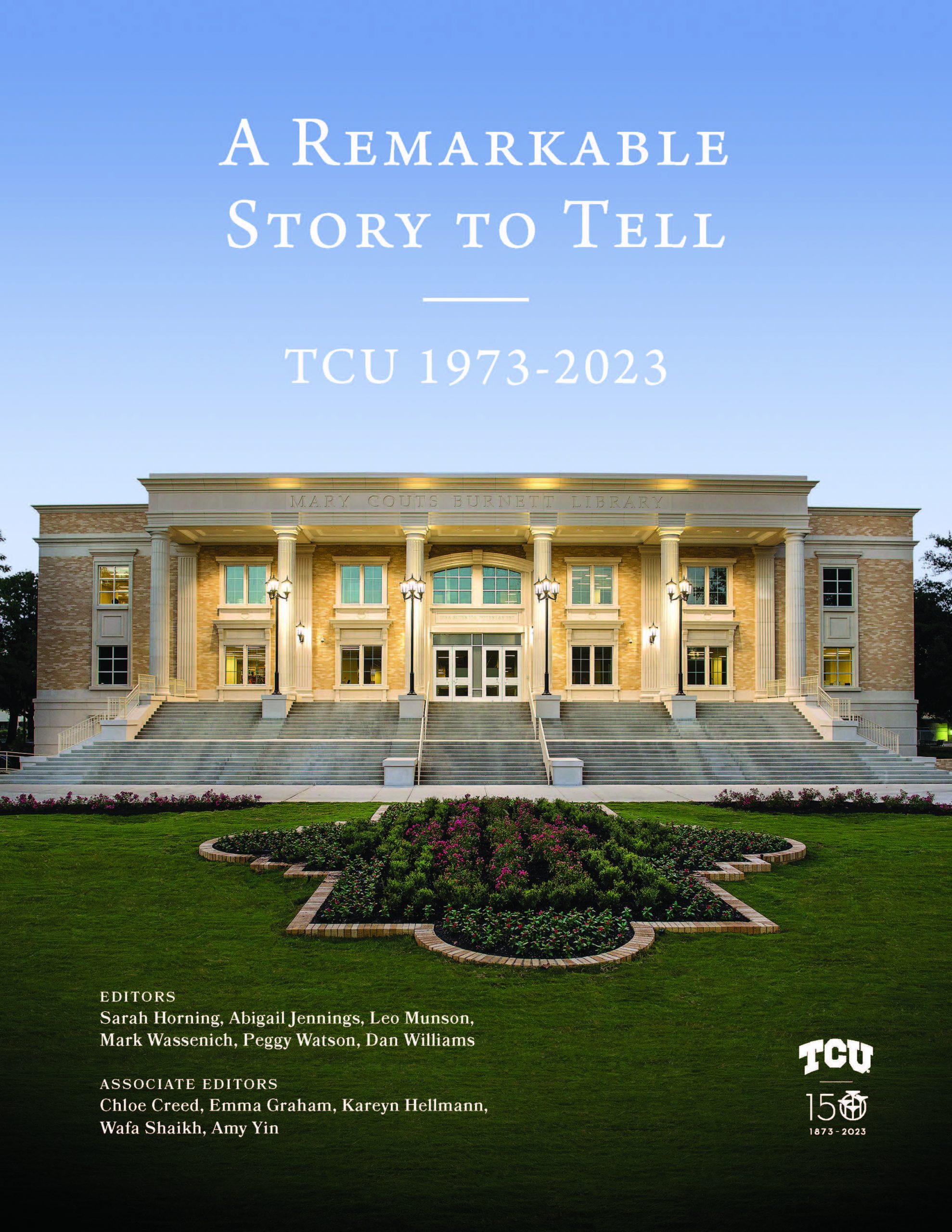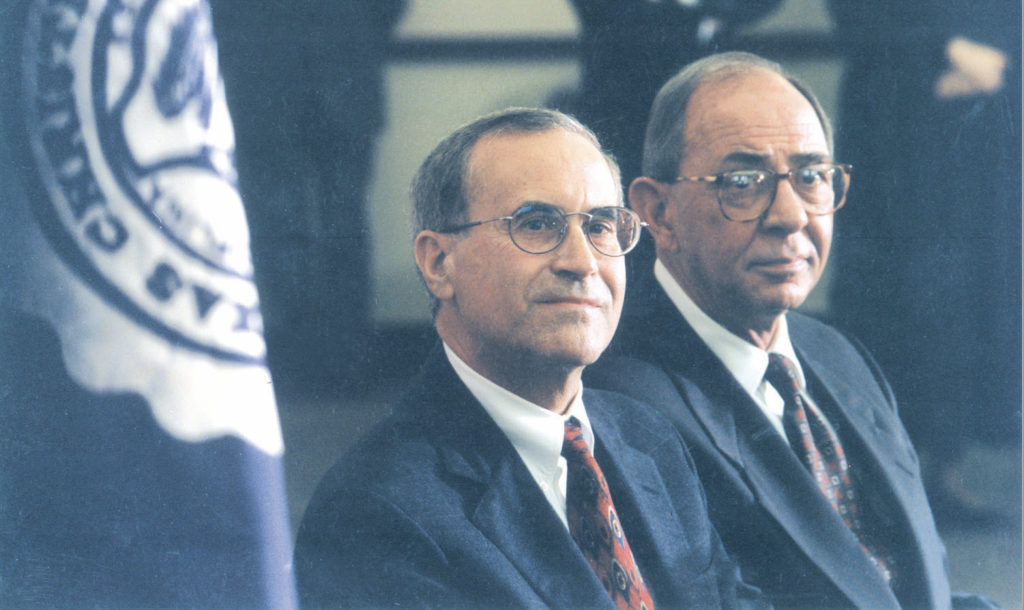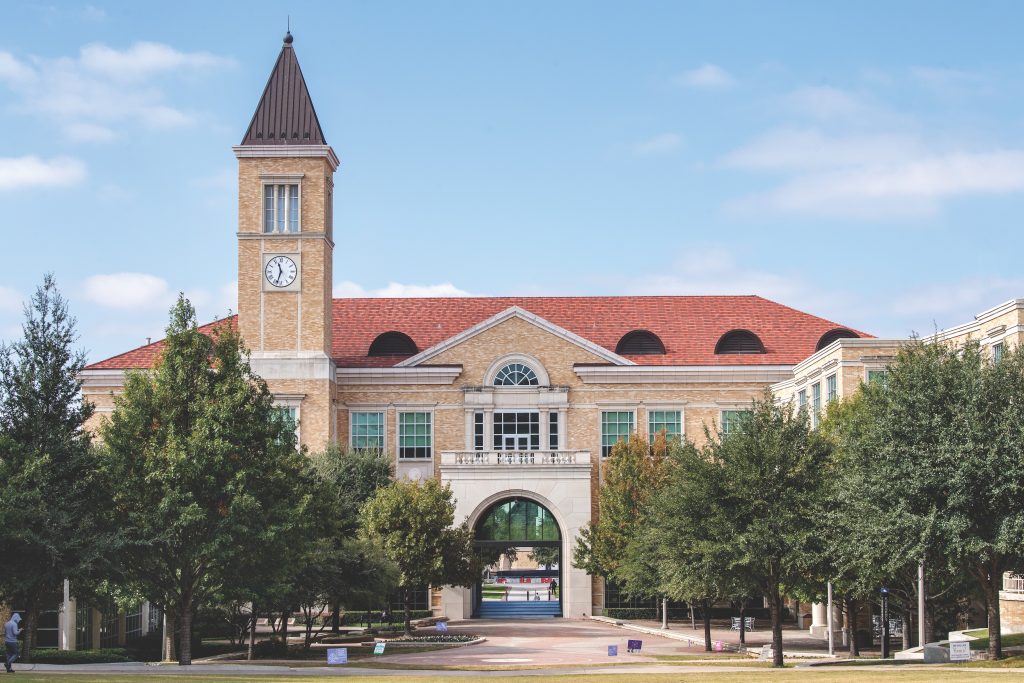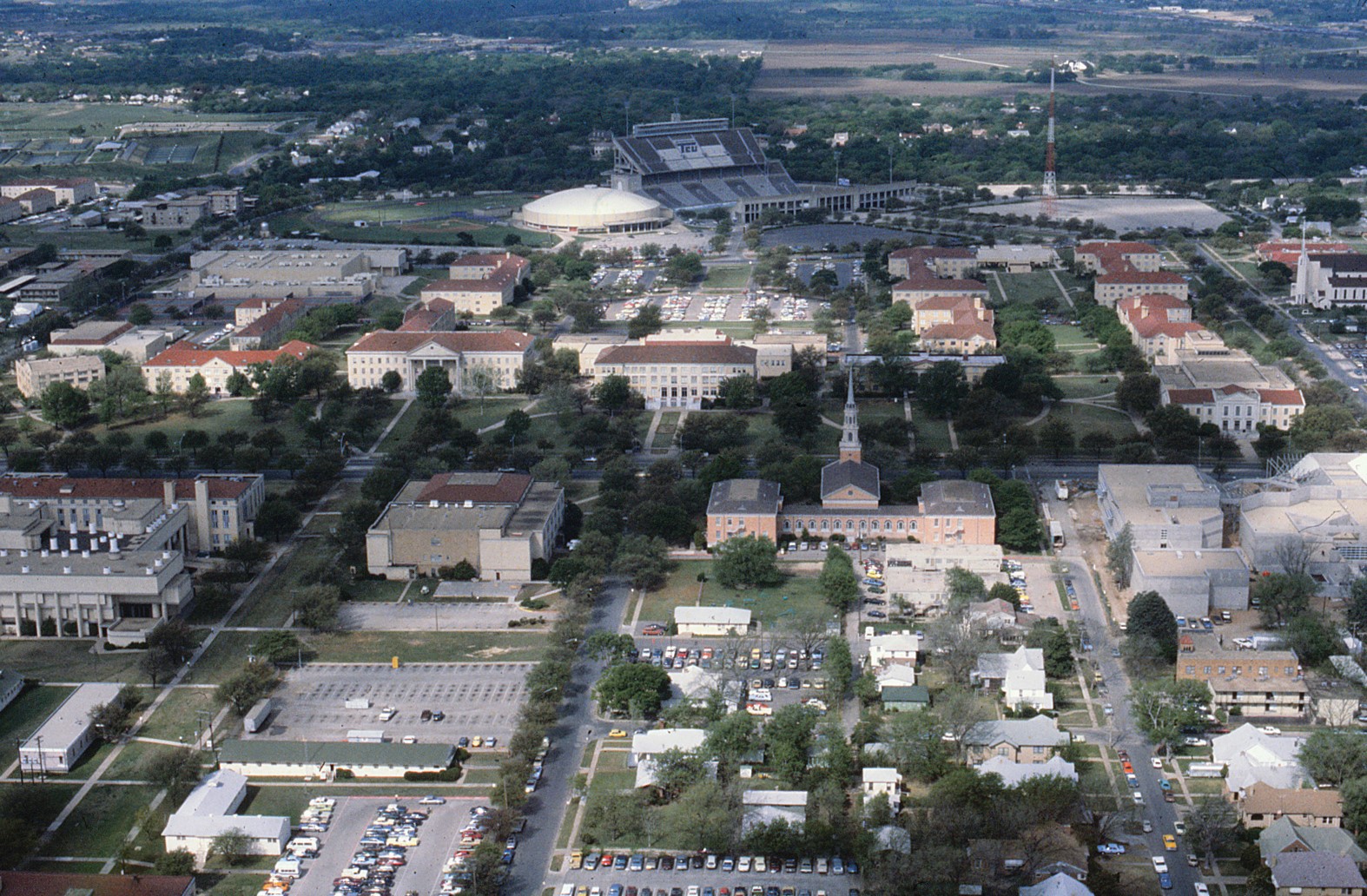Turning New Pages
Book contributors reflect on the school’s turning points in ‘A Remarkable Story to Tell.’


A Remarkable Story to Tell: TCU 1973-2023 is expected to be available in October 2023.
Turning New Pages
Book contributors reflect on the school’s turning points in ‘A Remarkable Story to Tell.’
Over the last 50 years, TCU has transformed from a good regional school into a university with an enviable national reputation. What led to such change inspired A Remarkable Story to Tell: TCU 1973-2023.
The 300-page hardcover book from TCU Press lands in October. It’s one of five titles that TCU Press is releasing to celebrate the university’s sesquicentennial. And it picks up where TCU’s First 100 Years: 1873-1973 left off.
Ample illustration and more than 400 images add punch to A Remarkable Story to Tell, whose narrative describes dozens of key developments. The book draws from interviews with more than 140 alumni, faculty and staff that were gathered through TCU’s Oral History Project. The transcripts alone filled 3,000 pages.
“It was important to present TCU as a community,” said Dan Williams, director of TCU Press. “I did a word search in the manuscript for ‘family,’ and there were dozens and dozens of mentions of TCU as family” in the interviews.
Six key contributors shared a distinct takeaway from the book.
Dan Williams
Director of TCU Press and Honors professor of humanities
TCU owes its evolution, Williams said, to the leadership of Chancellors William Tucker ’56 BDiv, Michael “Mick” Ferrari and Victor J. Boschini, Jr.
From Tucker’s tenure through Boschini’s, the TCU endowment has flourished, growing both scholarships and endowed faculty positions. New building and landscaping have transformed the physical campus. Advances in diversity, equity and inclusion have been realized in the establishment of programs like Community Scholars, and improvements have been made in the student-faculty ratio and student-retention rate.
“I hope [the book] gives people insights into the extensive community of people and partnerships that strengthened TCU these past five decades,” Williams said.

Michael Ferrari, left, and the man he replaced as chancellor, William Tucker, were instrumental in the change that has occurred at TCU the past 50 years. Photo courtesy of TCU Digital Collection
Leo Munson
Retired associate provost for academic support
Munson, who worked in admissions, financial aid and enrollment earlier in his career, said a turning point in TCU’s reputation came in 1984, when the university began to limit the number of incoming students.
Chancellor Tucker reported to the Board of Trustees that the move would “control the enrollment … so that the type and quality of educational experience at TCU can be maintained.”
“We took a risk and succeeded, and that sent a groundswell of surprise through the high school counselor community,” Munson said. “The sudden perception change was really important. It was a point of inflection for TCU’s educational reputation.”
Mark Wassenich
Donor and alumnus
For Wassenich ’64, A Remarkable Story to Tell captures strengthened faculty-student connections.
“Back in the day, there wasn’t much overt appreciation for faculty or any employee at the university. When Linda [Pilcher Wassenich ’65] and I started investing in TCU, we wanted to recognize mentorship,” he said, referring to the Wassenich Award for Mentoring in the TCU Community.
The couple brought the idea to Ferrari. “He jumped on it,” Wassenich said. “He was very interested in moving the university to a practice of lifting up faculty and staff to higher elevation.”


Included in A Remarkable Story to Tell are images that show how TCU has changed. A 1968 shot of the Brown-Lupton Student Center and parking lot is paired with a recent photograph of the Brown-Lupton University Union and Campus Commons. Top photo courtesy of TCU Special Collections. Bottom photo by Jeffrey McWhorter
Peggy Watson
Founding dean of the John V. Roach Honors College and Spanish professor
Among the transformations detailed in A Remarkable Story to Tell, Watson is especially proud of the Community Scholar program, begun under Ferrari, that makes possible a fully funded education at TCU for exceptional students of color from local high schools.
“We are now able to attract great students who wouldn’t have considered coming to TCU,” said Watson, who led several Community Scholars, many of whom had never traveled, on study-abroad programs in Spain.
Abigail Jennings
Production manager of TCU Press and alumna
For Jennings ’20, the most striking takeaway from A Remarkable Story to Tell is how much the physical campus has changed. “I kept reading how brown everything was back then,” she said, referring to the pre-landscaping years, “and then I saw the photos.”
In the book, Jennings found relevance in the names of campus buildings when she learned about the people for whom they’re named. She also appreciated understanding how Peggy Watson’s vision for the Honors College manifested as a school that Jennings personally experienced.


An aerial shot of the campus from the 1970s, above, and one of the campus from 2022 shows how much construction has taken place at the university in the past 50 years. Top photo courtesy of Thomas Wiederhold, bottom photo by James Anger
Amy Yin
Senior nutrition major
The personal perspective shared in A Remarkable Story to Tell sticks with Yin, a Chancellor’s Scholar.
“Learning how Chancellor Ferrari came up with TCU’s mission statement was interesting. … He met with faculty and staff to create this, and they wanted the statement to fit on a coffee cup.
“It was meaningful to me to learn how DEI came about, how the study-abroad program developed and flourished,” Yin said. “For a moment, I got to slip into the minds of people who … laid the groundwork for what I get to enjoy as a student at TCU.”

Your comments are welcome
1 Comment
Happy to finally see this coming out! My class was one of the 1st to work on the Oral History part of the project with Dan and Leo!!
Related reading:
Features
A Stellar Space
Oscar Monnig’s passion for meteorites is on full display at a TCU gallery bearing his name.
Features
Forgotten No More
TCU’s Race & Reconciliation Initiative shows the promise of the future through a face from the past.
Features
The Promise of a Name
Ties to the Disciples of Christ have steered TCU from the start.